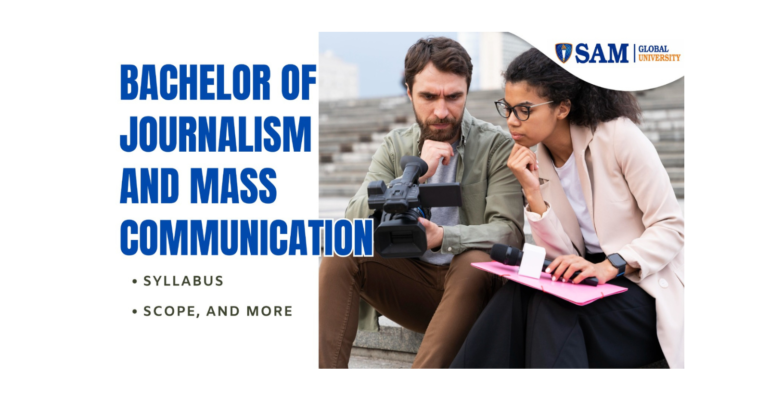Bachelor of Journalism and Mass Communication: Syllabus, Scope, and More
September 14, 2024 2025-03-24 5:00Bachelor of Journalism and Mass Communication: Syllabus, Scope, and More

Bachelor of Journalism and Mass Communication: Syllabus, Scope, and More
1. What is B.J.M.C (Bachelor of Journalism and Mass Communication)?
Bachelor of Journalism and Mass Communication (B.J.M.C) is a 3-year undergraduate program designed to provide students with comprehensive knowledge in various fields of media and communication. It includes journalism (both print and electronic), public relations, advertising, digital media, and mass communication. This course aims to produce skilled professionals capable of working in dynamic media environments, with a focus on ethics, creativity, and technological proficiency.
The degree equips students with the skills to gather, transmit, and analyze information, which is critical for a fast-paced media industry. It blends theoretical studies with practical exposure, ensuring students are job-ready upon graduation.
2. Full Form
The full form of B.J.M.C is Bachelor of Journalism and Mass Communication.
3. Course Overview
The B.J.M.C course is multi-faceted, covering various aspects of communication, media production, and journalism. Students get a chance to explore the principles of mass communication, delve into the nitty-gritty of reporting, learn about content creation for print and digital platforms, and understand how media shapes public opinion.
This course is perfect for students passionate about storytelling, journalism, and the media world, whether it’s traditional print, radio, television, or the booming digital space.
Key areas of focus:
- News reporting and editorial skills
- Media ethics and media law
- Understanding of mass communication theories
- Basics of digital media and new technologies
- Public relations, advertising, and marketing communication
- Visual communication and media production
4. Duration
The B.J.M.C course lasts for 3 years, broken into 6 semesters. Each semester covers both core and elective subjects along with practical training, internships, and projects.
5. Syllabus
The syllabus of B.J.M.C is dynamic and adapts to the ever-changing media landscape. Below are some of the key subjects covered throughout the course:
1st Year: Foundation Year
- Introduction to Journalism: Basics of news writing, reporting, and journalism ethics.
- Introduction to Communication: Understanding mass communication models and theories.
- Indian Polity & Constitution: Overview of the Indian Constitution and media’s role in democracy.
- Writing for Media: Basics of writing for newspapers, magazines, and online platforms.
- Media Law & Ethics: Important legal principles and ethical standards for journalists.
2nd Year: Specialization
- News Reporting and Editing: Techniques for gathering, analyzing, and editing news.
- Public Relations and Corporate Communication: Crafting PR campaigns and managing public image.
- Digital Media and Online Journalism: Introduction to online content creation and social media strategies.
- Broadcast Journalism (Radio & TV): Reporting for radio and television platforms.
- Photography and Videography: Visual storytelling skills for various media.
3rd Year: Professional Skills
- Advertising & Media Planning: Principles of marketing communication and media buying.
- Event Management: Organizing, planning, and promoting events.
- Film Studies: Understanding cinema and its impact on mass communication.
- Internship: Practical training with media houses or PR agencies.
- Project/Thesis: Research or a practical project on a media-related topic.
6. Entrance Exam
Admission into the B.J.M.C program may require an entrance examination, depending on the institution. Some popular entrance exams for B.J.M.C are:
- IPU CET: Indraprastha University Common Entrance Test
- DUET: Delhi University Entrance Test (conducted by NTA)
- XIC OET: Xavier Institute of Communications Online Entrance Test
- CUET: Common University Entrance Test for central universities
- SET: Symbiosis Entrance Test
Each exam tests the student’s aptitude in areas like general knowledge, current affairs, logical reasoning, and basic English skills.
7. Scholarships
At SAM Global University and many other institutions, scholarships are available to help students cover tuition fees. These scholarships can be:
- Merit-Based Scholarships: Awarded to students who perform exceptionally in their previous academic records or entrance exams.
- Need-Based Scholarships: Given to students from economically disadvantaged backgrounds.
- Special Scholarships: Available for students from reserved categories like SC/ST/OBC or for students excelling in sports or extracurricular activities.
Students can also apply for external government scholarships and schemes to support their education.
8. Fees
The course fees for B.J.M.C at different institutions can vary. For example, at SAM Global University, the annual fees typically range between ₹50,000 to ₹1,00,000. This cost may cover tuition fees, lab charges, and access to media labs and libraries, though additional charges may apply for practical training or special events.
9. Career Scope
B.J.M.C graduates can explore various job opportunities in the media, entertainment, and corporate communication sectors. Some popular career options include:
In Journalism:
- Reporter/Journalist: Work for newspapers, TV channels, radio, or digital platforms.
- News Anchor: Present news on television or radio.
- Photojournalist: Use photography to tell compelling stories.
- Editor/Proofreader: Manage and edit content before publishing.
In Media & Communication:
- Public Relations Executive: Handle the public image of companies or individuals.
- Content Writer/Copywriter: Write content for online platforms, blogs, or advertising campaigns.
- Social Media Manager: Create and manage social media strategies for brands.
- Advertising Executive: Work with advertising agencies on creative campaigns.
In Entertainment:
- Film/TV Producer: Manage the production of films or television shows.
- Radio Jockey: Host shows and present content for radio stations.
Digital Media:
- Digital Journalist: Report for online news platforms and manage blogs.
- SEO Specialist: Optimize content for search engines in the media industry.
Other Roles:
- Corporate Communications Officer: Handle the communication between a company and its stakeholders.
- Event Manager: Plan and execute corporate and social events.
Discover the world of media with our Journalism & Mass Communication courses at SAM University!
10. Why SAM Global University?
SAM Global University stands out for B.J.M.C because of its commitment to delivering a holistic education experience. Here’s why SAM is the ideal choice:
- State-of-the-Art Facilities: The campus boasts modern media labs, recording studios, and editing suites, offering students hands-on experience.
- Experienced Faculty: The university has a team of seasoned professionals from the media industry guiding students through every step of their education.
- Practical Exposure: SAM emphasizes internships, field visits, workshops, and seminars with industry professionals.
- Internship Opportunities: The university has tie-ups with leading media houses, advertising agencies, and public relations firms for real-world exposure.
- Scholarships: SAM offers various scholarships to help deserving students ease their financial burden.
11. FAQs
Q1: What are the eligibility criteria for B.J.M.C?
A: Students must have completed 10+2 with a minimum aggregate of 50% from a recognized board. Some institutions may require an entrance exam.
Q2: Can science students pursue B.J.M.C?
A: Yes, B.J.M.C is open to students from any stream (Science, Commerce, or Arts) as long as they meet the eligibility criteria.
Q3: What is the average salary after completing B.J.M.C?
A: The starting salary for B.J.M.C graduates ranges from ₹2.5 lakh to ₹6 lakh annually, depending on the job role and location.
Q4: Is B.J.M.C a good career choice?
A: Yes, it is a rewarding career with diverse opportunities across print, electronic, and digital media, along with lucrative roles in advertising, PR, and corporate communication.
Q5: What higher education options are available after B.J.M.C?
A: Graduates can pursue A. in Journalism and Mass Communication, MBA in Media Management, or specialized diploma courses in public relations, digital media, and advertising.
Get Free Career Counselling
Related Posts
What To Do After 12th Here Is A Quick Guide
Top High Salary Courses After 12th Science 🚀💰
Search
Categories
Popular Tags








